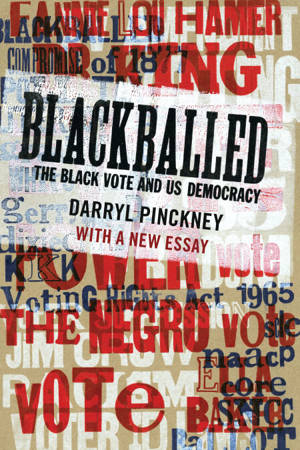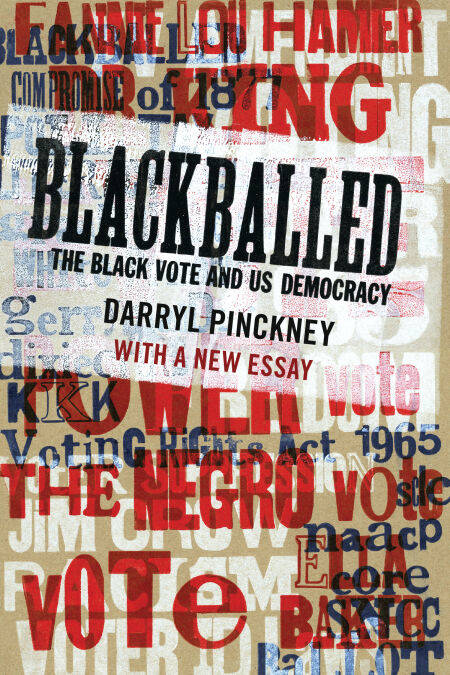
- Retrait gratuit dans votre magasin Club
- 7.000.000 titres dans notre catalogue
- Payer en toute sécurité
- Toujours un magasin près de chez vous
- Retrait gratuit dans votre magasin Club
- 7.000.0000 titres dans notre catalogue
- Payer en toute sécurité
- Toujours un magasin près de chez vous
14,73 €
+ 14 points
Description
An incisive reflection on black electoral politics, disenfranchisement, and the lasting legacy of the civil rights movement—now with a brand-new essay on the Covid-19 pandemic, reparations, and the 2020 George Floyd protests.
Blackballed is Darryl Pinckney’s meditation on a century and a half of participation by blacks in US electoral politics. In this combination of memoir, historical narrative, and contemporary political and social analysis, he investigates the struggle for black voting rights from Reconstruction through the civil rights movement to Barack Obama’s two presidential campaigns. Drawing on the work of scholars, the memoirs of civil rights workers, and the speeches and writings of black leaders like Martin Luther King and Stokely Carmichael, Andrew Young and John Lewis, Pinckney traces the disagreements among blacks about the best strategies for achieving equality in American society as well as the ways in which they gradually came to create the Democratic voting bloc that contributed to the election of the first black president.
Interspersed through the narrative are Pinckney’s own memories of growing up during the civil rights era and the reactions of his parents to the changes taking place in American society. He concludes with an examination of ongoing efforts by Republicans to suppress the black vote, with particular attention to the Supreme Court’s recent decision striking down part of the Voting Rights Act of 1965.
Also included here is Pinckney’s essay “What Black Means Now,” on the history of the black middle class, stereotypes about blacks and crime, and contemporary debates about “post-blackness,” as well as a new essay, “Buck Moon in Harlem,” which reflects on Juneteenth and the ongoing fight for racial justice, and offers a glimpse of New York City amid the Covid-19 pandemic and the protests following the killing of George Floyd.
Blackballed is Darryl Pinckney’s meditation on a century and a half of participation by blacks in US electoral politics. In this combination of memoir, historical narrative, and contemporary political and social analysis, he investigates the struggle for black voting rights from Reconstruction through the civil rights movement to Barack Obama’s two presidential campaigns. Drawing on the work of scholars, the memoirs of civil rights workers, and the speeches and writings of black leaders like Martin Luther King and Stokely Carmichael, Andrew Young and John Lewis, Pinckney traces the disagreements among blacks about the best strategies for achieving equality in American society as well as the ways in which they gradually came to create the Democratic voting bloc that contributed to the election of the first black president.
Interspersed through the narrative are Pinckney’s own memories of growing up during the civil rights era and the reactions of his parents to the changes taking place in American society. He concludes with an examination of ongoing efforts by Republicans to suppress the black vote, with particular attention to the Supreme Court’s recent decision striking down part of the Voting Rights Act of 1965.
Also included here is Pinckney’s essay “What Black Means Now,” on the history of the black middle class, stereotypes about blacks and crime, and contemporary debates about “post-blackness,” as well as a new essay, “Buck Moon in Harlem,” which reflects on Juneteenth and the ongoing fight for racial justice, and offers a glimpse of New York City amid the Covid-19 pandemic and the protests following the killing of George Floyd.
Spécifications
Parties prenantes
- Auteur(s) :
- Editeur:
Contenu
- Nombre de pages :
- 144
- Langue:
- Anglais
Caractéristiques
- EAN:
- 9781681375601
- Date de parution :
- 16-11-20
- Format:
- Ebook
- Protection digitale:
- Adobe DRM
- Format numérique:
- ePub

Les avis
Nous publions uniquement les avis qui respectent les conditions requises. Consultez nos conditions pour les avis.






